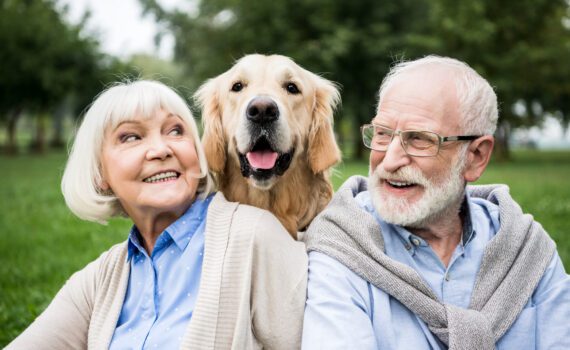
Should Senior Citizens Have Pets?
As an official senior citizen, I must declare my bias: I live with three beautiful dogs and am an active hobby breeder, so yes, I believe seniors and loving pets are a great match: in general. But none of us live an “in general” life. We all live our own particular lives, and some of us, regardless of age, are better suited to living with pets than others. Let’s consider some facts that should influence an elderly person’s decision about acquiring a pet.
Things to Consider
- Many seniors live alone with more than 40% regularly experiencing loneliness. The unconditional love and tactile stimulation of a dog or cat bring joy, pleasure, and purpose into a lonely life.
- Caring for a pet helps seniors maintain healthy routines for their pets which encourages healthy routines for themselves. For example, pets need to be fed twice a day, reminding seniors to prepare their own meals, too. Pet’s water needs to be freshened daily reminding seniors that their hydration is also important. If memory is a problem, a calendar can be set up with check-off reminders for daily, weekly, and monthly pet-related tasks.
- Petting a dog or cat has remarkable physical health benefits for their humans. Numerous studies reported in the Journal of Science have shown that heart and blood pressure issues are positively affected by cuddling and physically caring for a pet which also decreases the stress hormone cortisol while increasing the feel-good chemicals serotonin and dopamine. Having a beloved pet in close proximity at night improves sleep, often a problem for seniors. And many elderly people report that their pets help ease their pain issues simply by taking their minds off the pain.
- Mental health is also improved by pet ownership. Sharing your life with a dog or cat can ward off depression associated with loneliness and lack of life structure. Cognitive abilities and neurological pathways which often begin to fade during retirement are nourished by the touch of a pet.
- Owning pets, certainly a dog, can also encourage seniors to get out, exercise and socialize. Walking a dog can be a gentle, leisurely way to increase movement or a brisk heart rate elevating part of a fitness routine, depending on your athleticism. Either way your dog will adore the change of scenery and new smells. It can be an excellent opportunity to meet and greet the neighbors and make new social contacts, another important consideration for isolated seniors.
- Retirees have the time to spend training and working with their dogs, creating a deep bond. Cats are more unpredictable in whether they want quality time or quantity time with their owners, but either way, they won’t be ignored.
Everything sounds so good, but before you rush off and buy Granny a cat or a dog please remember we are talking about pet ownership benefits in general. Every senior is an individual whose lifestyle must be evaluated on its own merits. There are some very strong reasons why pet ownership is not appropriate for certain seniors.
3 Serious Things To Think About
The First Evaluation Would Be Health Limitations.
If you cannot take care of yourself, you will not be able to take care of a dog or cat. Having an honest discussion with your physician might be a smart first step. While certain adjustments can be made such as using a mobile vet or grooming service, owning a pet does require some physical dexterity and strength. Instead of walks, most dogs can be quite happy with an appropriately sized backyard, or dog walking and poop-scooping services can be hired. Cats are not quite as high maintenance as dogs, but litter is heavy, and cleaning the box is a daily chore. Mobile groomers offer invaluable services that arthritic hands may no longer be able to do.
This Brings Us to the Second Evaluation: Finances.
Many seniors live on fixed incomes that could be stretched beyond the limit with the expenses of pet food and vet needs. Assess your financial situation fully with a disinterested third party before you chose a pet.
And Finally, Remember That Your Pet May Outlive You.
Formulating a plan for that sad eventuality may cause you to rethink pet ownership in the twilight years. Or you may have a family member or friend who would welcome your pet into their lives.
Decide Carefully
There is no doubt about the benefits of pet companionship for senior citizens, and after honestly analyzing your situation and mulling over the pros and cons you should be able to make a confident decision. If pet ownership doesn’t look practical for you, please consider making visits to shelter animals who crave company or ask your senior health care experts to recommend you for pet therapy visits. Both will help satisfy your craving for animal companionship. But if the signs are favorable for bringing a pet into your life – do it! You will find your new dog or cat a priceless remedy for many of the challenges of aging and a steadfast best friend ‘til the end.
By Carol Kendig